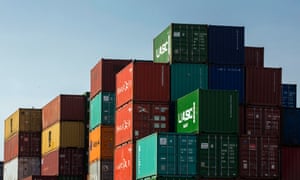
Brexit means Brexit is the slogan of Theresa May’s new government, but more than a month after the seismic decision to leave the EU, no one knows what Brexit means. Only one thing is sure – unpicking Britain’s membership will be a monumental task requiring years of arduous and painstaking negotiations.
“I just can’t imagine a more complicated and more difficult issue to take forward,” said Andrew Hood, a senior director at the Dechert law firm and a former legal adviser to David Cameron. “People at the heart of government were sitting down a week after the Brexit decision with an entirely blank sheet of paper.”
The UK will have to negotiate no fewer than six deals to re-establish its place in the world after Brexit, according to Charles Grant of the Centre for European Reform thinktank. Negotiations will be far longer and more complicated than many British politicians realise, for reasons he set out in a recent paper.
One set of talks will cover Britain’s EU divorce, a second the free-trade agreement with the union and a third will be needed to work out interim measures while the talks are being thrashed out. Number four on Grant’s list is regaining full membership of the World Trade Organisation, five is replacing the trade deals the UK enjoys as an EU member and six will be to sort out the UK’s future ties with the EU on foreign, defence and security policy.
At the same time, the British government will have to work out how to keep the country united. Then there is resetting a swath of policies across sectors including science and research, farming and fisheries, environment and support for poorer regions – an agenda British officials expect will dominate every Queen’s speech for a decade. The huge and complex will be managed by a civil service that has reached a postwar low in staff numbers against the backdrop of an economy teetering on the brink of recession.
The gruelling marathon of negotiations starts with Britain’s EU exit, a process that will involve 27 other member countries and three union institutions: the European council, European commission and European parliament.
The UK will have to negotiate its divorce with the EU under the now famous article 50. A spokesman for May reiterated this week that it would not be triggered before the end of the year, setting the clock ticking on a two-year deadline to conclude the exit talks. These discussions will be far from simple, throwing up knotty questions – for example, who pays the pensions of 2,700 current and retired British EU officials.

In parallel, the UK will start talks on a new trading relationship with the EU, a negotiation that the European council president, Donald Tusk, has speculated could take at least five years. Several Brussels insiders think this is overoptimistic, which is why many also expect an interim deal to ease the transition.
Next on the government’s to-do list is re-establishing trading links with all major trading partners outside the EU. The UK will have to regain full membership of the WTO, and re-sign the 39 trade deals covering 65 countries negotiated by the EU.
Britain joined the WTO in 1995 under the umbrella of the EU, which represents its member states in international trade talks. Roberto Azevêdo, the WTO director general, warned in the run-up to the 23 June vote that “key aspects of the EU’s terms of trade could not simply be cut and pasted for the UK”. When asked about Brexit, a WTO official referred back to those remarks, where Azevêdo stressed “trade would continue [but] could be on worse terms”. He also said British exporters could face £5.6bn in extra duties on goods they want to sell abroad.
In order to re-establish credentials in the WTO, the UK needs the approval of 164 members from Afghanistan to Zimbabwe. Most observers do not see this as an insurmountable hurdle, but some countries could use the opening to seek better trade terms or as leverage on something else. “The history of the WTO shows that things can move very slowly and other factors, beyond the intrinsic merits of whatever the trade deal is, can come into play,” said Hannah White, the Brexit lead at the Institute for Government thinktank.
British trade negotiators will have to get into the mind-boggling arcana of WTO agreements governing tariffs and subsidies, known as schedules. One of the first questions is what happens to the EU schedules. The EU, for example, can import 58,000 tonnes of top-quality steak from South America under WTO rules, but no one knows how much of that share belongs to the UK. “There will be a three-way negotiation between us, the WTO and the EU,” White said.

Meanwhile officials from the newly created trade department will be jetting around the globe to keep British ties with the 65 countries that have a trade agreement with the EU.
Before the Brexit vote, leave campaigners assumed these deals would continue seamlessly. Trade arrangements with the rest of the world would remain “totally unchanged”, the former chancellor Nigel Lawson said. But every single one could be reopened. In an ideal world countries would keep existing deals going, Hood said. “But will most countries want to do that? If I were in their shoes, I would be thinking hard about how I get the best deal for my country.”
Brexiters have enthused about selling more to the US and China, but about two-thirds of British trade is done either with the EU or countries that have signed a trade deal with the bloc. The National Institute of Economic and Social Research, which has done the number-crunching, points out that no free trade agreement would be as good for the UK’s crucial service sector as the EU single market. Tariffs and subsidies are important for buying and selling beef or bananas, and selling services abroad requires getting into the nitty-gritty of common regulations and professional standards.
The UK is legally barred from signing any trade agreements while it remains an EU member. Any would-be trading partners the UK woos will want to know what kind of access to the EU single market Britain will have before they sign. The US trade representative, Michael Froman, has played down hopes of a quick deal, noting it was “not possible to meaningfully advance” UK-US trade talks until some of the basic issues on the future EU-UK relationship had been worked out.
None of these trade talks can begin seriously until the government has worked out pressing domestic questions. Will British farmers be protected against cheaper competition with import tariffs? Is the government prepared to “mostly eliminate” manufacturing by opting for unfettered free trade, as the leading leave economist Patrick Minford has argued? Will the four nations and all the regions of the UK get behind the vision of turning Britain into a “buccaneering offshore low-tax nation” favoured by some leave campaigners? A month after the vote, these questions have barely been discussed.
While these policy debates rumble on, the UK is scrambling to create a trade department from scratch. The government aims to have 300 specialist staff in place by the end of the year, a spokeswoman said, but it is unclear how many will have had direct experience of trade negotiations.
Even 300 would not be enough. One former EU trade negotiator, Miriam González Durántez, estimated the UK would need at least 500 negotiators. The EU typically sends 20 commission negotiators to any round of trade talks, backed up by between 25 and 40 technical experts, she wrote in the FT earlier this year. The UK has 40 trade negotiators, compared with the 550-strong trade department in Brussels.
Keeping democratic oversight of years of painstaking, highly technical and politically charged negotiations with scores of countries will also be a mammoth task for Britain’s elected representatives.
“Keeping parliament updated when negotiations are running on different tracks will be a really big challenge,” White said. She wants to ensure any new parliamentary committees set up to scrutinise Brexit have “a clear role and route to influence government”.
For now, parliament’s means to hold the government to account over Brexit remain hazy. It is just one more of the many unanswered questions about what it really means to take back control.
[Source: The guardian]



